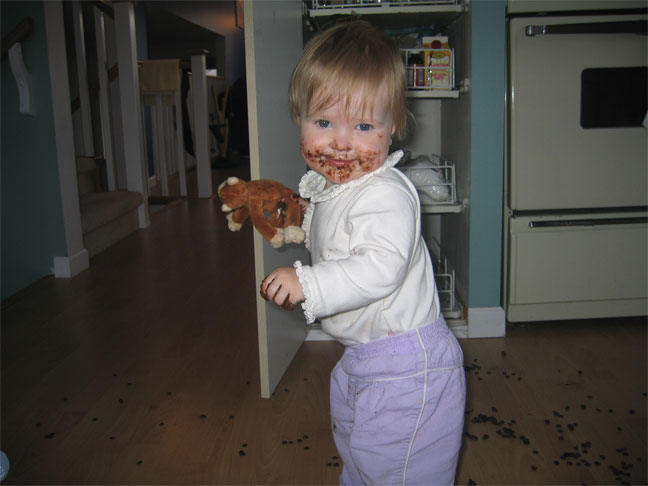Tag: toddlers
Stay patient while teaching toddlers how to handle strong emotions
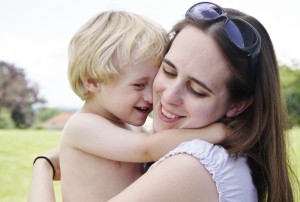 Over the past few months, my 3-year-old son has been going through a phase of hitting his brother and sister when he’s angry.
Over the past few months, my 3-year-old son has been going through a phase of hitting his brother and sister when he’s angry.
I’ve been working a lot with him, telling him that his angry feelings are okay but that hitting isn’t, and trying to find better ways for him to express that anger. But still, every time he was provoked by his brother or had a toy stolen by his sister, he was quick to hit them.
It has been frustrating for me.
Sometimes, it feels like we keep trying to get the same messages across to our children with no results. We wonder, Why aren’t they getting it? It feels like we’re failing or doing something wrong. But it’s just that it takes time and consistency with young children.
I remind myself of how many times I had to redirect my 1-year-old daughter from pulling books off the shelves. She didn’t get it after the first or second time. It took a lot of time, a lot of patience, and a lot of consistency on my part. It’s the same with a toddler who’s learning to manage emotions.
We may feel sometimes that our children aren’t even listening. But they are. And they’re learning from what we model to them, too. Every time we stay calm when we’re angry, they notice it. Every time we allow strong feelings while stressing limits, they notice it. And this will pay off.
Recently, my oldest son did something to upset my 3-year-old, and I saw my younger son run after him, ready to hit. Even before I could intervene, he stopped. Instead of hitting his brother, he hit the bed. I saw the brief pause — that moment where he gained control of himself and channeled his anger into something that wasn’t going to hurt his brother. That moment was huge.
But even when our children do finally get it, it won’t be 100% of the time. There will still be emotional fights over toys, and times during the day when they’re tired and more easily upset. Even adults have difficulty managing emotions at times, and we don’t always handle our own anger the right way. Our children won’t always, either — because they’re human and because they’re still learning.
We just need to remember to be patient with the process of teaching them.
Moments
Editor’s note: Welcome to Attachment Parenting (AP) Month 2015! This year, we celebrate the theme: “Parental Presence: Birthing Families, Strengthening Society.” Beginning this year, APtly Said is the new home of AP Month, so check the blog each day of October for inspiration through our Daily Tips and other posts centered on the theme. Want to tell your story of how you balance(d) financial/career needs with being a new parent and providing presence in the early years? Send us your story!
Other AP Month events include the annual API Auction and Photo Event, plus an Oct. 19 API Teleseminar with Simplicity Parenting‘s John Kim Payne. Follow along as we read his book through API Reads, also housed here on APtly Said. There will also be special articles in the Parent Compass enewsletter from API’s cofounders and The Attached Family online magazine.
For this first day of AP Month, Yvette Lamb helps us remember that our challenges in providing parental presence in the early years are but moments that we will remember fondly and that help shape our child’s perception of what love is.
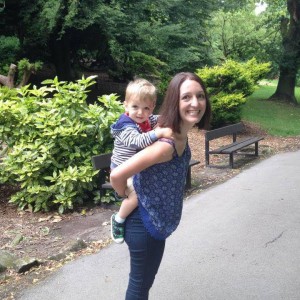 Children must go through almost a million phases, particularly in the early years. Sometimes I could barely get used to my baby’s latest pattern before he had moved on to a different one! Some phases — especially regarding sleep, settling, behavior or needing more attention than we are able to give — can feel never-ending at the time.
Children must go through almost a million phases, particularly in the early years. Sometimes I could barely get used to my baby’s latest pattern before he had moved on to a different one! Some phases — especially regarding sleep, settling, behavior or needing more attention than we are able to give — can feel never-ending at the time.
But of course they do pass, all of them.
And when we look back at testing moments — at days that seemed to stretch on forever — we mostly remember them differently: fondly, with love. They are just moments after all…moments that will pass…moments that become memories sandwiched in our hearts, reminding us how much our children have changed and grown — and how we have, too.
My son is only 2 years old, but recently I have found myself starting so many conversations with my husband with the words, “Do you remember when he used to…?” It might be about him refusing to sleep anywhere but on us or only at the breast or when rocked for at least 30 back-aching minutes, or cluster-feeding him every evening, or how he used to cut up my dinner so I could eat it with a spoon.
We told him about some of these memories this morning as he sat dawdling with his breakfast, smiling ear-to-ear at the little person he used to be but can’t remember.
“And when you were a tiny baby, you couldn’t speak. Everything was just ‘Waaahhhh’ until we rocked or fed you — sometimes all day.”
He laughed delightedly at us, “All day, all day, waaahhh!”
I do acknowledge that, back then, it didn’t always seem like much fun. I sometimes felt like I was living in a state of constant exhaustion, almost afraid of the baby I had made but didn’t understand. And yet, though I haven’t forgotten this, I know it was how early parenting had to be for me, for him. The rocking, the feeding, the tiredness, the uncertainty — it was necessary for me, and it was mere moments in the grand scheme of raising our boy.
We built foundations. We learned to adapt. And also to eat one-handed and survive on mere crumbs of sleep.
And now there are other phases, other challenges. There’s daycare and separation anxiety. There’s fussy eating and kicks at diaper changes. There’s lying down every night next to his crib, him demanding our hand be wedged uncomfortably through the bars while he unwinds from his day and eventually drifts off. Any gentle suggestion he go to sleep without us, or with us sat near but not practically inside his cot, are firmly and loudly rejected.
We are not going to leave him when he doesn’t want us to. But it can be difficult. We are always tired from our day by this point, and we want to have our dinner and unwind, not to mention finish any necessary jobs before our own bed calls. Sometimes after I’ve been on bedtime duty, I practically stagger down the stairs, disorientated from an uncomfortable 10-minute sleep on the floor or grumpy with hunger and the weight of the things I had planned, but will not get to do, for my evening. I have witnessed much of the same from my husband.
But last night I realized that my stress and concern over this current issue is completely misguided. We won’t still be doing this in 5 or 10 years. I know we won’t. Perhaps with some gentle encouragement or perhaps completely naturally, our son will learn to fall asleep without us near. Right now, though — in this moment — he needs us. He needs us until the day he doesn’t any more and all we have left is the memory of his slowing, rhythmic breathing and occasional checking of our presence through the brushing of his tiny, soft hand against ours.
Despite the practical downside, these moments are beautiful. He is our wonder, our masterpiece. He wants to be with us — just for a little longer — and really, how is that anything short of wonderful?
So although moments like these — when our children need almost more than we are able to give — can be frustrating and challenging, they are just moments. And when we tell our son about this particular phase in a few years, when his oh-so-grown-up exterior refutes our claims of him needing us, there will be no frustration attached. The desperation to get downstairs and eat dinner will have long since passed and we will be left with just the good parts: the closeness, the being there, the love.
We will remember these moments, even though he will not. But what I hope he is left with is a warm glow of being loved, of feeling love, of knowing love — for him — when he needed it.
It’s alright that you need me
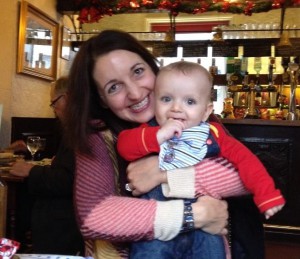 My child, I want to say this to you: It’s alright that you need me.
My child, I want to say this to you: It’s alright that you need me.
Needing is good. Needing is natural. When you cry for me, when you wrap your arms around me, when you sigh because you feel happy in my arms…you’re behaving just as you should. You are finding out where you fit in this world, discovering all there is around you and learning how to feel safe.
You are young and new and so many things at the same time: brave and unsure, loud and quiet, shy and confident, content and needy. You are all of these things, and that is alright.
I have worried before. We spend a lot of time together, which is lovely for me and, I hope, for you, too. But I sometimes have thoughts like, Will you struggle to settle without me? and Should you be more self-assured?
Then I remember, you have your whole life to be bold and independent. And what a big life you will have.
I want to reclaim need and dependence as good things. I want to remind everybody that these are qualities, not inadequacies. These natural urges ensure protection, security, safety. They are a big part of love and trust: You trust me enough to depend on me, to allow me to see your need.
It is alright to need people. It is alright to rely on them. It is alright to know that there are people in your world that will stand by you, on whom you can depend. In fact, it is more than alright — it is wonderful.
And you my little boy — in your own time — will take tentative, then hurried, steps away from me. You will let go. Then I’m quite sure I will wonder why I ever worried that you needed me so much, and I’ll miss those arms around my legs as I try to make dinner, those soft snores on my pillow that leave no room for my head, and those contented sighs as I scoop you up and make everything alright with a kiss.
I’ll miss the days when just being me, being with you, was all you needed.
It isn’t always easy to be needed, especially in the early and intense days when only I would do so much of the time. But I know also that it is a gift to hold such a big space in your heart. You trust that I will be there, that I won’t let you down, that I love you wholly — and to you, that is everything. You and I are everything, and everything is enough.
So need me, call me, demand me, exhaust me. And then smile — and I’ll be there for it all — every day.
And of course I will cheer you on, as almost each day it seems you need to do more things by yourself: take off your shoe, undo your zipper, brush your teeth. You are so proud! You need this, too, and I will never stand in your way. But for the times you need me, be it a hug between plays or holding on tight as we navigate something new, I will be here. To give you what you need, for as long
as you need it.
As your world gets bigger, I won’t be able to provide everything that you need, but for now, I can — and that makes me very privileged. So keep on keeping on, and I will, too — watching you lean, then lead, then leave.
So remember, it’s alright that you need me, and whether you know it or not, little one…I need you, too.
Second child adjustments, and judgments
 As I heard the voices grow louder and the confrontation was escalating, I approached my 9-year-old daughter’s room. She exclaimed at her younger brother: “Ugh… You are so annoying! How is it possible? How am I even related to you?” I was startled by the harsh words.
As I heard the voices grow louder and the confrontation was escalating, I approached my 9-year-old daughter’s room. She exclaimed at her younger brother: “Ugh… You are so annoying! How is it possible? How am I even related to you?” I was startled by the harsh words.
I understood her frustration. It seems as though her brother, almost three years her junior, has made it his mission in recent weeks to get under her skin. And he succeeded! But I was not pleased with her choice of words. I explained that I understand her frustration and suggested she use other words to express her feelings.
As I turned and walked away, I shook my head and chuckled. She did have a good point: My daughter and her brother were conceived from the same genetic pool and are raised in the same household, yet their personalities are so distinct. I was reminded of the realizations my second child blessed me with.
My daughter was a high-needs baby. Then, around the age of 2 1/2, her fussiness seemed dissipate as she blossomed into a content, independent and cooperative child.
In comparison, my son was an easy-going baby. I thought I had “conquered” parenthood and found the perfect balance between nurturing and discipline. But my son put a deep dent in my thoughts around the age of 2. While my daughter was a determined toddler with the typical tantrums, my son took determination and defiance to a whole new level. He was also physically aggressive. Communicating was not an issue as he used sign language by the age of 6 months and spoke at an early age, so I believe the difference was due to innate tendencies.
Nevertheless, I was not prepared. The parenting approaches that worked so well with my daughter were not effective with my son.
In response to my son’s aggressive manners, my sister said that if she didn’t know us, she would assume that we are aggressive, even physical, in our home. That comment turned on a light bulb for me and I wondered, Are these the kind of judgments people make about my family?
I wasn’t troubled by other people’s opinion of me or my family; I had already endured ample criticism about my parenting style. What bothered and embarrassed me was the notion that I may have been guilty of judging other parents. What I learned is that I ought to reserve assumptions and judgments of other parents. We are all facing challenges and have unique situations.
In nursery school, at a parent-teacher conference, I inquired with my son’s teacher if she witnessed any aggressive behavior. Her face displayed a sense of confusion as if she didn’t understand why this question was brought up. If I could read her mind, she may have thought: What child are you talking about? She responded that he was gentle and never showed aggression toward another child.
Another light bulb turned on: I understood that our parenting approach at home was not effective as his behavior at school and that we had to make changes to see a difference in my son’s behavior at home. We implemented different strategies at home, emphasizing more consistency, boundaries and encouragement. We are still trying to strike the “perfect” approach with our son.
This insight was valuable when my son started Kindergarten, where it was even more evident that my kids’ learning habits, skills and interests are as distinct as their personalities.
Today, when I disclose to my friends who know my son well that he was very physical as a toddler, they display a familiar confused face. This time, that expression puts a smile on my face. I treasure the realizations he led me to:
- As parents, we should know better than to cast judgments on other parents, as we are not aware of the situations and circumstances other families are facing nor do they really matter.
- As parents of multiple children, we need recognize and embrace that each child has his or her unique personality and needs to be engaged accordingly.
Tantrums are opportunities to connect
Before I became the mother of a toddler, I remember listening to other parents describe their little one’s behavior with the term “terrible twos.”
To be honest, I had no idea what kind of behavior was meant by the term except that whatever was going on during this stage in a child’s development was somehow “terrible” or at the very least, challenging for the parents.
As my high need baby grows into an almost 2 year old, I am — and believe me, I am not bragging — now the enlightened mother of a child who is going through her terrible twos. My dear Annabelle is, one instant, a cheerful little girl who listens to mom and dad — and likes them — and the next, she is a take-charge, march-to-the-beat-of-her-own-drum rebel who has little patience for her pesky parents.
Since we practice Attachment Parenting, I often turn to other parents in my local API Support Group as well as books on Attachment Parenting. My favorites are those written by the Sears family; right now, The Discipline Book is helping me make sense of those intense “terrible twos” moments with my toddler, who the Sears might describe as a “tantrum-prone child.”
If you are a parent of a toddler who is short-tempered, you may be reading this post, nodding your head in understanding. If not, then consider yourself the lucky parent of a mellow toddler.
Whatever your experiences with your child, I hope you will understand that I love my daughter very much, am attentive to her, hold her, nurse her and do my very best to parent her from my heart. That said, there are times when I feel overwhelmed by her tantrums, and on those days when I am especially sleep-deprived and the world is foggy, I simply don’t know what to do…although I often consider these the best days to rest, lay low and let my little one read books in bed with me.
My own responses to my daughter’s tantrums range from giving in to her demands — for example, when she says “mine,” I passively tell her “okay” — to firmly saying “no,” which I really really dislike saying since it reminds me of own authoritarian father.
At a recent play date where Annabelle insisted on bringing her helium-inflated balloon, I foresaw the balloon triggering a tantrum or perhaps a power struggle with another child and then I observed the accuracy of my intuition when Annabelle pushed her playmate down as the child attempted to touch the balloon. In the past, I simply removed toys that triggered power struggles between children at our playgroups. This time, I apologized to the parent of the child who Annabelle pushed and then asked Annabelle to sign her apology to the child. I then told my daughter that the balloon needed to take a break. Perhaps because of the commotion, Annabelle completely melted down.
In The Discipline Book, the Sears devote an entire chapter to tantrums that they call “Taming Temper Tantrums.” Underlying the advice in this book is the Sears’ ideal that parents encourage “desirable actions” and discourage “undesirable behavior.” Below, I’ve listed several techniques that the Sears recommend for discouraging tantrums and other undesirable behaviors that I’ve found helpful:
- Practice Attachment Parenting — By practicing Attachment Parenting International’s Eight Principles of Parenting, we can establish a strong bond with our children and stay in tune with their emotions and thoughts.
- Identify triggers — As I mentioned earlier, I notice that certain situations will upset my daughter to the point that she feels like she is going to lose control, like sharing a favorite toy or leaving the park when she is having lots of fun. At the same time, I find myself surprised at times that she has become upset or needs some quiet time to herself. The Sears recommend making a behavior chart and noting what kinds of circumstances encourage desirable behavior versus undesirable behavior.
- Know yourself — A child who is prone to getting upset may have a parent who is also highly sensitive. By learning healthy ways to respond to a tantruming child, a sensitive parent may avoid making the situation worse by acting quickly. The Sears also suggest that parents who throw tantrums seek professional help so that they may move beyond their own undesirable behavior.
Even the most attentive of parents who are totally in tune with their children may find themselves with a tantrum-throwing child. Since our children are expressing their frustrations by throwing a tantrum, according to the Sears, parents can use these moments as opportunities to connect with their child. The Sears suggest that parents help give a word to what their children may be feeling while tantrumming, to gently hold and talk soothingly to the child, and to reassure the child that things will be okay.
With these approaches for managing tantrums, I feel more confident that I will be prepared to help my daughter the next time she gets upset and overwhelmed by her emotions.
What experiences have you had as the parent of a tantrum-prone toddler? What suggestions do you have for helping a child (and parents) manage overwhelming emotions? Have you found any books on Attachment Parenting to be helpful to you when your child was going through the “terrible” and “terrific” twos?
Being Compassionate with Yourself
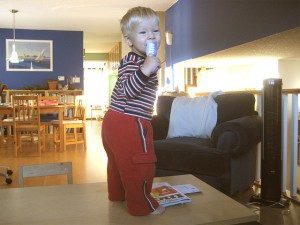 Yesterday evening, my family got together with another family for dinner. While my own kids are now 9 and 6, the kids in the other family are 4 and 2.
Yesterday evening, my family got together with another family for dinner. While my own kids are now 9 and 6, the kids in the other family are 4 and 2.
Dining with a 2 year old, especially, was a walk down memory lane for me and my husband. While my kids are still working on some of the finer details of proper etiquette, they no longer drink from a sippy cup, require a bib or throw their food on the floor. And when my kids aren’t at the table, I don’t need to keep my eyes on them at every moment. They know not to climb up on the stove or run out of the front door into traffic.
As children grow, it’s very easy to forget what life was like a few short years ago. Kids always keep us hopping as they move on to new adventures and challenges. I feel like all of my parental brain space is taken up with what I’m dealing with right now. There just isn’t much mental energy left to recall in fine detail what it was like to parent a toddler.
When I spend time with someone else’s toddler, though, it all comes back to me.
As I look back over my children’s early years, one of the things I wish is that I had been gentler with myself. From this side of the fence, I can see that parenting a busy toddler is a lot of work. Parenting a busy toddler and a baby at the same time is even more work.
It’s no wonder that, when my children were small, my house wasn’t as clean as I wanted it to be all the time — that I was so tired in the evenings, that I sometimes struggled to stay in touch with my friends or run errands or find time to get my hair cut.
One of Attachment Parenting International‘s Eight Principles of Parenting is Respond with Sensitivity. The idea is that we build a bond of trust and lay the foundations for empathy by understanding our children’s needs and responding appropriately. In the process, we nurture a secure attachment with our children. They learn that they can count on us to be there when they need us, and this helps them to develop the confidence to venture off into the world independently when they’re ready.
Our children aren’t the only ones who can benefit from sensitivity. We can benefit from responding sensitively to our own needs. When we’re really busy with life and work and parenting young children, our own needs often take a backseat to everything else that is going on. In fact, we may even beat up ourselves, because we can’t do everything perfectly all the time. I think that’s too bad.
Now that my children are a little older, I can say with confidence that while life is hectic during those infant and toddler years, they don’t last forever and things do get easier. By being as gentle as possible with yourself while you’re in the thick of things, taking care of little ones who need a lot of your attention and energy, you’re demonstrating sensitivity and empathy to your children.
We want our kids to grow into caring and compassionate people. One of the ways we encourage that is by being caring and compassionate toward our children. Another way that we do that is by being caring and compassionate with ourselves. When you cut yourself slack, you teach your children how to recognize and take care of their own needs.
Achieving balance is hard, and it requires us to constantly re-assess and re-evaluate what’s happening in our lives. As children grow and change, the balance changes, too. At every stage, though, compassion is a great tool. Whether that means dragging yourself out of sleep in the middle of the night to respond sensitively to a teething baby or being gentle with yourself because the vacuuming didn’t get done (again), the compassion is the same.
And those lessons in sensitivity and compassion will last long after the toddler years are over.
Editor’s Pick: Children Growing on “Toddlers and Wonder”
“One of the best gifts you can give your toddler and yourself is to find time to join him where he is in that expectant openness, to slow down, to see what they see and hear what they hear, to let go of deadlines, plans, goals, wishes, to just be together.” ~ Kim Allsup, Children Growing
“One of the best gifts you can give your toddler and yourself is to…just be together.” Wow, doesn’t that just sum up Attachment Parenting, not only for the toddler years but for all ages and stages of our children, from in utero through adulthood?
Kim of Children Growing brought her post, “Toddlers Blooming in the Garden: Finding Wonder (Part 2 of 4),” to my attention earlier this month. While APtly Said posts original material, Attachment Parenting International recognizes select blog posts and articles related to Attachment Parenting (AP) through API Links and occasionally through reprints in the Attached Family magazine. But I just had to share this one on APtly Said, and so we are beginning a new series called “Editor’s Pick,” where we recognize outstanding AP posts from bloggers beyond APtly Said. Anyone can request a review of their blog post.
After reading Kim’s post, I was very interested in learning more about her and inviting her to blog for APtly Said. I hope we get to see more from her soon!
Kim introduces Children Growing as “a teacher’s blog about the art of helping children grow–at home, at school and in the garden.” Kim is a classroom and gardening teacher at The Waldorf School of Cape Cod in Bourne, Massachusetts, USA. She has been growing children for 43 years, including 21 years as a teacher, and gardening for 40 years. She is passionate about helping parents to return to their own memories of their childhood in order to re-experience wonder of the natural world with their own children.
And so, without further ado, here is Kim’s post:
Toddlers Blooming in the Garden: Finding Wonder (Part 2 of 4)
“If a child is to keep alive his inborn sense of wonder, he needs the companionship of at least one adult who can share it, rediscovering with him the joy, excitement, and mystery of the world we live in.” ~ Rachel Carson
Wonder in the first years of life creates the roots of self-motivation. It is the foundation of a personal connection to the world, the nexus of the self. Wonder cannot be scripted. It arrives unbidden. And while we cannot call forth wonder just when we want it, we can be expectant. The best a person can do is to be always listening, always watching, open to the possibility that something amazing might come our way, aware that it is possible, or even likely, that the marvelous will arise out of the commonplace, amid the happenings of everyday life. This openness to wonder is a transcendent state we aspire to as adults, yet it is the natural state of young children.
One of the best gifts you can give your toddler and yourself is to find time to join him where he is in that expectant openness, to slow down, to see what they see and hear what they hear, to let go of deadlines, plans, goals, wishes, to just be together. There is no better place to do this than the garden. You might head to the garden with the intention of meandering with your child at her speed, following her interests. Or, you might be working in the garden with your little one nearby, sensitive to noticing a moment that calls you to put down your rake so you can kneel on the damp earth and let your toddler lead the way to the discovery of a blossom or a butterfly or a strawberry or the green spikes of the emerging corn he planted himself.
A toddler’s mood of wonder can be fragile. Protect it by moving slowly, by dwelling in the fullness of silence, by noticing your child’s focus, using only a few carefully chosen words. Above all, don’t direct, explain or praise. When you find your way to becoming a companion to your toddler in an experience of wonder, you will find that time seems to stop. You may enter this realm for only four or five moments, but if you truly connect, if you drink in your child’s amazement, you will return to a place you once knew, a place where you lived as a child, where you feel beckoned to return. It is ironic that grown ups seek distant gurus to guide them to a consciousness of expectant, awareness when focused attention with a toddler, perhaps in a garden, might satisfy our mysterious yearning, might lead us back to the forgotten mindset our own early years. For, wonder is our first home.
Toddlers and young children usually live in a sense of wonder that is not shared with adults. If you think back to your own early years, perhaps you can remember moments of fascination that you did not share, that you could not share, for you did not have the words. Once you re-enter a toddler’s world of wonder, you will be awed by the value of this consciousness. You will want to provide your child with undisturbed time in nature, in a forest, by the sea, in a garden. For many families, a garden is the most accessible natural area. It can be on a balcony, of a tall apartment building, or a single garden bed in a tiny back yard. For a child, it is a place to witness the magic of growth, to know the beauty of life, to find wonder.

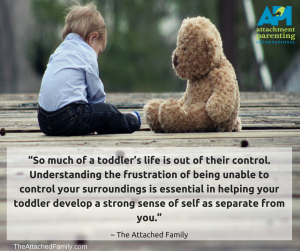


![Reblog this post [with Zemanta]](http://img.zemanta.com/reblog_e.png?x-id=d5fd631b-65b1-4312-8b34-fefaa458256a)
